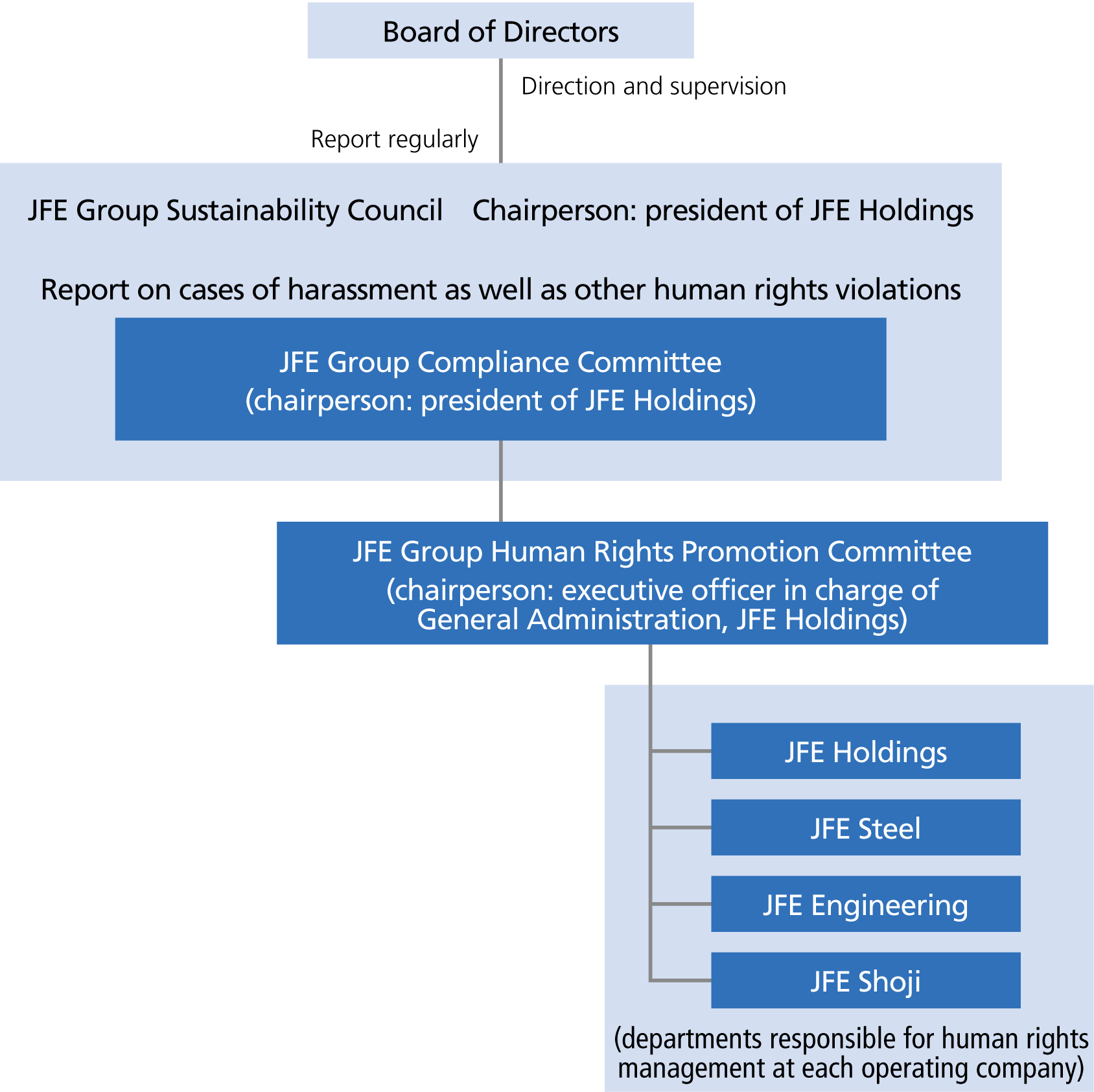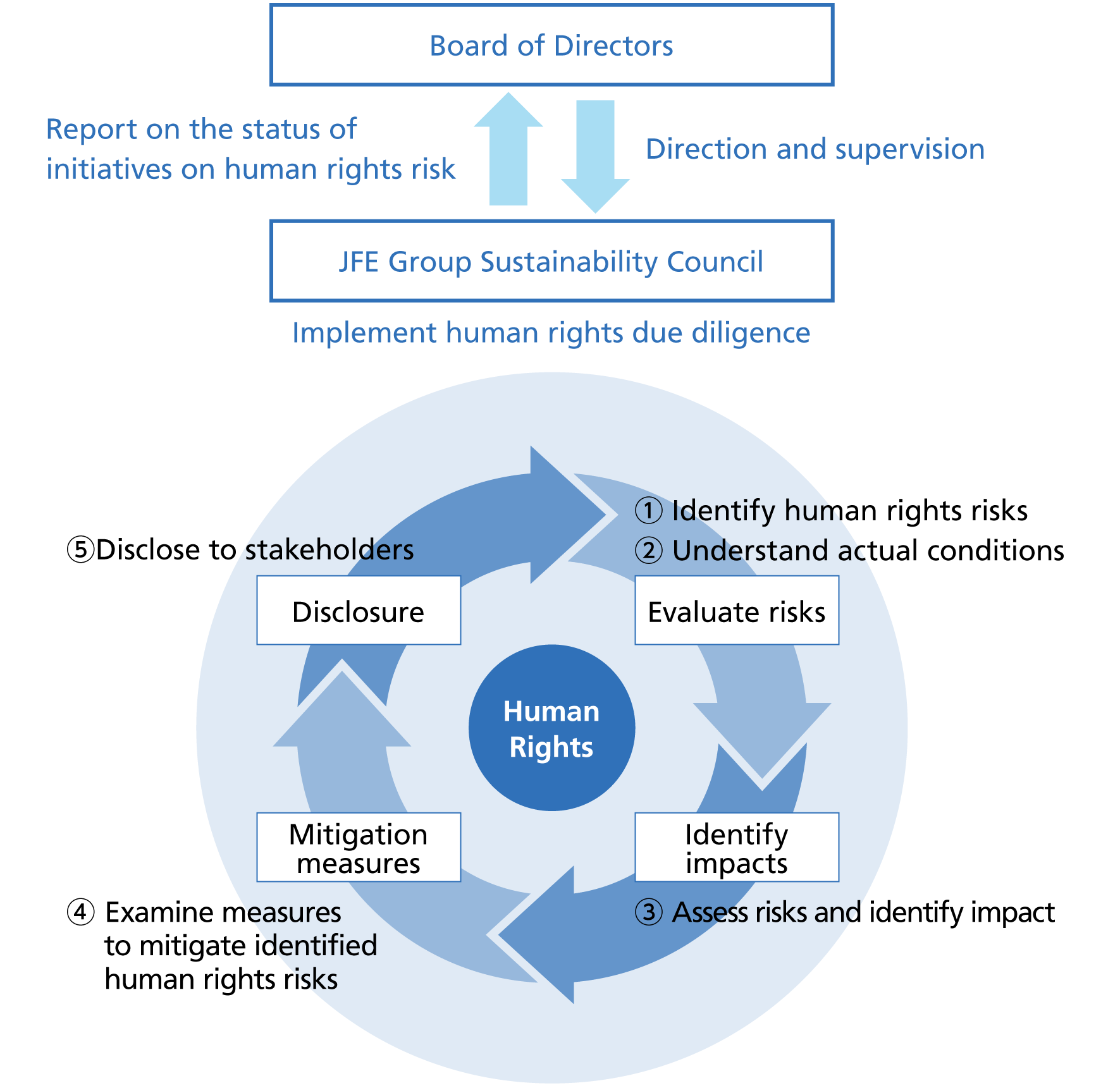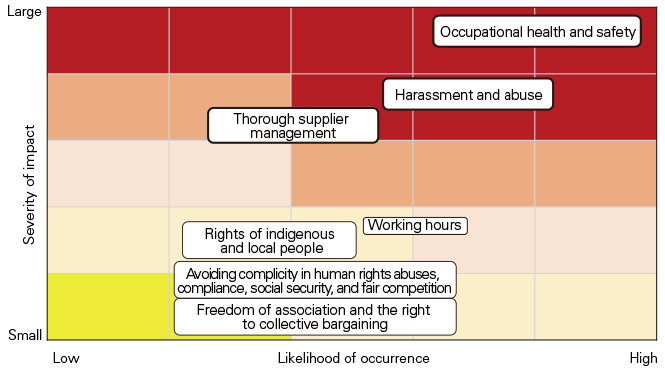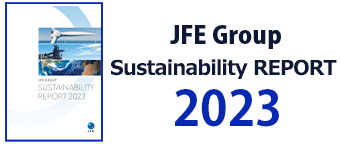Human Rights
Basic Policy
The JFE Group views respect for human rights as both a corporate social responsibility and a foundation of its business. Our determination to prevent discrimination in our business operations is clearly expressed in our Standards of Business Conduct, which we have consistently upheld. In FY2018, the JFE Group Human Rights Basic Policy was established as a standard to which Group companies and their officers and employees must comply in order to further clarify the approach to our initiatives. Under the policy, we also seek cooperation from all stakeholders including our supply chain to respect and protect human rights.
We have been conducting human rights due diligence since fiscal year 2021 in accordance with the United Nations Guiding Principles on Business and Human Rights, while organizing seminars by external experts on human rights. Given recent changes in human rights awareness and concerns, the JFE Group Human Rights Basic Policy was revised in April 2023 to further strengthen the JFE Group's efforts to respect human rights. Under the new version of the policy, every operating company inspected and revised its procurement guidelines and related materials, thereby strengthening the Group's efforts throughout the supply chain.
We will continue to promote initiatives for realizing a society in which human rights are respected and protected.
JFE Group Basic Policy on Human Rights
JFE hereby establishes the JFE Group’s Basic Policy on Human Rights based on the United Nations Guiding Principles on Business and Human Rights in order to promote Group-wide efforts to respect human rights and to fulfill its responsibilities to all stakeholders that it influences in the course of its business activities.
-
1Basic approach to respect for human rights
We, the JFE group, support and respects the International Bill of Human Rights, which consists of the Universal Declaration of Human Rights and the International Covenants on Human Rights, as well as the International Labor Organization (ILO) Declaration on Fundamental Principles and Rights at Work.
We believe that respect for human rights is a corporate social responsibility and a foundational aspect of our operations. In addition to clearly stating and implementing our policy for respecting all members of the company and the general public and refraining from any form of discrimination in our corporate activities, we implement initiatives to ensure that we are not complicit in human rights abuses.
This policy represents our commitment to respect human rights based on the JFE Group Standards of Conduct.
-
2Scope of application
This policy applies to all officers and employees of the JFE group. We also encourage all stakeholders, including members of our supply chain, to understand and support this policy.
-
3Compliance with applicable laws
We comply with the laws and regulations of Japan and all other countries and regions where we operate, but if there is any conflict with internationally recognized human rights and regulations, we seek ways to respect internationally recognized human rights as much as possible.
-
4Human rights due diligence
We identify negative impacts on human rights and utilize our internal mechanisms for human rights due diligence to prevent or mitigate such impacts.
-
5Corrections and remedies
We maintain reporting contact points for receiving reports from both internal and external sources regarding negative impacts on human rights caused by any of our business activities. If we are made aware that we have caused or been involved in a negative impact on human rights, we will follow the necessary procedures to correct and remedy the problem.
-
6Education
We provide education on respecting human rights to ensure that all of our officers and employees understand and implement the company's basic policy.
-
7Oversight
The JFE Group Sustainability Council, chaired by the President of JFE Holdings, Inc., oversees compliance with this policy and the implementation status of initiatives referred to herein.
-
8Dialogue and consultations with stakeholders
Among the initiatives taken under this policy, we utilize outside experts as well as engage in discussion and consultation with internal and external stakeholders.
-
9Information disclosure
We appropriately disclose all relevant information about our initiatives concerning respect for human rights and the progress of such initiatives via JFE group websites and other means.
-
10Business-related human rights issues
(1) Non-discrimination and equality under the law
We respect every individual connected with our corporate and business activities and do not discriminate on the basis of race, nationality, ethnicity, creed, religion, social status, lineage, age, gender, sexual orientation, gender identity, disability, or any other such factor.
(2) Engaging with business partners
We seek the cooperation of all of our business partners in initiatives to respect and protect human rights in order to contribute toward creating a society in which the rights of all humans are respected and protected.
(3) Harassment
We do not engage in any kind of harassment based on gender, status, or any other factors, including through language or behavior that offends or violates the dignity of others.
(4) Forced labor and child labor
We never use forced labor or child labor in any country or region. We also do not tolerate or sanction any form of modern slavery, including bonded labor and human trafficking.
(5) Occupational health & safety and appropriate working environments
In accordance with the fundamental idea that safety is our top priority above all else, we pursue health and safety in all of our activities and strive to create safe, healthy workplaces where all employees feel assured that their physical and mental health is protected.
(6) Working hours and livable wages
We comply with all laws and regulations concerning working hours and wages applicable in the countries and regions where we operate. We work to ensure wages that allow employees to enjoy an adequate standard of living.
(7) Right to freedom of association and collective bargaining
We respect employee rights to freely associate and collectively bargain in accordance with the laws and collective bargaining agreements in each country. In addition to taking into account each country's laws and labor practices, we work to build sound labor-management relations and resolve problems by engaging in sincere and constructive dialogue with employees in accordance with international norms.
(8) Rights of local and indigenous peoples
We respect and give due consideration to local people's land rights, access to water, safety and health as well as the rights of indigenous peoples in regions where we operate.
This policy revision was formulated with the assistance of human rights experts and approved at the JFE Group Sustainability Council chaired by the President of JFE Holdings, Inc.
Established: April 2018
Revised: April 2023
Yoshihisa Kitano, Representative Director, President and CEO
JFE Holdings, Inc.
Structure
Promoting Human Rights
In order to steadfastly focus on human rights initiatives, we established the JFE Group Human Rights Promotion Council, chaired by the corporate officer of JFE Holdings under the JFE Group Compliance Committee, chaired by the president of JFE Holdings. This framework allows us to define Group-wide policies and regularly share information with departments responsible for human rights issues that have been set up at each operating company.
In addressing all human rights risks, we emphasize communicating with stakeholders through such initiatives as setting up a Corporate Ethics Hotline at each operating company and an independent law firm as an external contact point, as well as dedicated consultation desks on harassment issues at major offices, all of which accept anonymous reporting and consultation on human rights and related issues. Furthermore, we receive inquiries, including anonymous requests concerning human rights issues and compliance from external stakeholders via the contact form on our corporate website. The operational status of these help desks and reports of harassment as well as other human rights violations are regularly reported to the JFE Group Sustainability Council and Board of Directors for their direction and supervision.
Development of the Whistleblowing System
Governance Structure for Human Rights Awareness Promotion

Targets and Results
Recognizing that contributing to the realization of a society in which the human rights of each and every individual are respected and protected is not only a corporate social responsibility but also a foundational principle of management, the JFE Group upholds respect for human rights across the supply chain as a key management issue and promotes its efforts by setting KPIs.
Material Issues of Corporate Management and KPIs
Human Rights Due Diligence
The JFE Group is committed to human rights due diligence based on the United Nations Guiding Principles on Business and Human Rights. In FY2021, the year when human rights due diligence was initiated, we identified human rights risks and examined corrective measures to be taken at the JFE Holdings and other Group companies, including operating companies. In FY2022, we revised the JFE Group Human Rights Basic Policy (hereinafter “the Policy”), and every operating company also inspected and revised their procurement guidelines in line with the policy to further strengthen our efforts to respect human rights throughout the JFE Group and its supply chain. Additionally, we discussed the method, scope, and priorities for conducting a survey on human rights risks throughout the supply chain. We are expanding our efforts by holding briefings on human rights and conducting surveys on related risks to ensure that Group companies identify, assess, reduce, and prevent human rights risks.
In FY2023, we will conduct a questionnaire survey on human rights risks with suppliers to ensure respect for human rights across the supply chain. We will also gradually expand our efforts at Group companies.
Human Rights Due Diligence Process
Human Rights Due Diligence Process

We created a long list of human rights risks by referring to international norms and guidelines and seeking advice from external human rights experts. Then, taking into account human rights risks specific to the industry, regional characteristics, and other relevant factors, we identified human rights risks related to the Group’s supply chain by stakeholder, such as employees and suppliers, including women, children, and local residents.
International norms and guidelines referenced:
United Nations Guiding Principles on Business and Human Rights, International Bill of Human Rights, ILO's Core Labor Standards, OECD Guidelines for Multinational Enterprises, Ten Principles of the UN Global Compact, GRI Standards, FLA Workplace Code of Conduct, and CHRB Key Industry Risks
15 human rights issues to consider:
| Compliance with standards and guidelines for respect for human rights demanded by international norms | Avoiding complicity in human rights abuses, compliance, social security, and fair competition | Prohibition of discrimination and equality before the law |
| Access to remedy | Thorough supplier management | Harassment and abuse |
| Women's rights | Child labor | Forced labor |
| Occupational health and safety | Working hours | Appropriate working environment |
| Wages that guarantee a decent standard of living | Freedom of association and the right to collective bargaining | Rights of indigenous and local people |
We ascertained the current status of the risk management system and activities by examining our disclosure of policies on child labor, forced labor and various other human rights risks, such as the JFE Group Human Rights Basic Policy and the Basic Procurement Policy of each company, our whistleblowing system for ensuring access to remedial action, our initiatives on compliance including prevention of corruption, and other initiatives, systems and rules concerning internal and external human rights issues.
We assessed the risks of the identified human rights issues to be considered, based on the severity of impact and likelihood of occurrence, and determined the status of our initiatives on respecting human rights through written surveys and interviews in order to better identify that status in our future endeavors. During the risk assessment, we also
determined the adverse impacts of human rights risks on the JFE Group and its stakeholders.
・Human rights risks identified as particularly high risk and requiring action
・Occupational health and safety
・Harassment and abuse
Map of Key Human Rights Risks

We implement mitigation measures for the identified human rights risks, including response as well as preventive and corrective measures and promotion systems. For occupational health and safety and harassment, we continue to strengthen our efforts to eliminate accidents and harassment using KPIs. To create a sustainable and resilient supply chain, we are establishing a human rights risk management system encompassing the entire supply chain. We will also conduct surveys on the human rights risks of suppliers by determining the priority of the surveys based on the severity of the impact of such risks and the likelihood of their occurrence.
Material Issues of Corporate Management and KPIs
The JFE Group Human Rights Basic Policy, guidelines for procurement at each operating company, and other information are disclosed on our website. Also, we will appropriately disclose Information on our initiatives to respect human rights, including human rights due diligence, and their status to our stakeholders.
FY2022 Initiatives
Inspect and Revise the JFE Group Human Rights Basic Policy
The JFE Group views respect for human rights as both a corporate social responsibility and a foundation of its business. Our determination to prevent discrimination in our business activities is clearly expressed in our Standards of Business Conduct, which we have consistently upheld throughout our operations. Given recent changes in public awareness and concerns related to human rights, we revised the JFE Group Human Rights Basic Policy, established in 2018, to further strengthen our efforts to respect human rights throughout the JFE Group and supply chain. We will steadfastly promote Group-wide efforts to respect human rights for all stakeholders, including suppliers, customers, and employees, toward realizing a society in which human rights are respected and protected.
Expand Human Rights Due Diligence to Group Companies
We have held briefings on human rights for approximately 70 Group companies and conducted fact-finding surveys thought writings and interviews at 14 Group companies so far. From the survey results, we identified priority issues and considered measures to reduce and prevent human rights risks, thereby promoting human rights due diligence throughout the Group.
Establish human rights risk management system for suppliers
We inspected and revised the procurement-related guidelines, based on the revised JFE Group Human Rights Basic Policy, and related material established by each operating company. In addition, considering the severity of impact and likelihood of occurrence of human rights risks, we determined the priorities for supplier surveys and prepared a questionnaire survey on human rights risks.
Future Initiatives
We will continue to implement initiatives to correct and mitigate identified human rights risks and take the following actions to expand our human rights due diligence.
Expand Human Rights Due Diligence to Group Companies
In FY2023, we will conduct new surveys on human rights risks at approximately 80 major Group companies in Japan. We will also continue to support Group companies that have already participated in the survey to correct and improve their human rights risks, and we will consider how to conduct periodic risk surveys and review progress.
We will also consider priorities and methods for conducting fact-finding surveys of our overseas Group companies.
Establish human rights risk management system for suppliers
We will continue to inform suppliers of the revised JFE Group Human Rights Basic Policy, guidelines, and other references. Furthermore, we will conduct a questionnaire survey on human rights risks for approximately 600 high-priority suppliers and support specific improvements based on their responses.
Consistently maintaining these initiatives will establish a system for reducing human rights risks throughout the entire supply chain. We will also assess and improve our initiatives for respecting human rights under the supervision of the JFE Group Sustainability Council and Board of Directors to increase their effectiveness.
Human Rights Promoting Activities
To consistently maintain our activities to respect human rights and raise employee awareness, we conduct human rights training courses, offer guaranteed equal employment opportunities, promote fair human-resource management, and actively prevent workplace harassment. Our training courses encourage employees to develop a thorough understanding of the JFE Group Human Rights Basic Policy and the respect for human rights expected of a company in the international community. To this end, we continuously monitor and following up on seminars against a KPI focused on attendance rate (attendance rate in FY2022: 100%).
We seek to prevent sexual harassment, the abuse of power, and other forms of harassment by addressing these issues in company regulations, displaying posters in workplaces, and organizing training by position (including management), individual offices, and executives. In addition, we invited an outside attorney to conduct a seminar on corporate ethics hotlines and harassment consultation desk staff (those who receive reports, including management) within the JFE Group. We regularly organize these training sessions for hotline and consultation desk personnel and held a workshop on the revised Whistleblower Protection Act in FY2022 (participants: approx. 200 in FY2020 and approx. 300 in FY2022).
Furthermore, we actively support and take part in initiatives undertaken by public organizations and groups promoting human rights as well as groups in which private enterprises participate, such as the Industrial Federation for Human Rights, Tokyo and the Corporate Federation for Dowa and Human Rights Issue, Osaka. By attending seminars and workshops sponsored or supported by such organizations and groups, we have become increasingly aware of human rights trends and challenges as well as issues specific to Japanese business. We then apply this knowledge in JFE human-rights awareness training programs and related initiatives.
Respecting the Rights of Workers
The JFE Group adheres to the laws and regulations of various countries as well as collective agreements. It also respects the rights to freedom of association as well as their right to collective bargaining.
Upper management, including the president and the representative of the union, meets regularly to discuss matters such as management issues, work life-balance, working environments, and working conditions. By conducting earnest labor-management consultations, we strive to create a vigorous workplace while working to maintain healthy and sound labor-management relations.
The JFE Group complies with laws and regulations related to salary payments and sets salaries above the minimum wage designated by country, region and industry sector. In addition to meeting legal requirements concerning the upper limits for overtime and other mandates, the JFE Group establishes challenging and satisfying working environments by providing our employees with one of the top levels of employment conditions in the industry as well as performance-based bonuses linked to company profits.
We regularly review the wage situation in each region and business sector and engage in honest discussions with the labor union to ensure a fair return to our employees while also paying due consideration to management and business performance.
Respect for Freedom of Expression
The JFE Group upholds basic human rights in its Human Rights Basic Policy and is committed to respecting and protecting the human rights of each individual throughout its corporate activities. We pay due care to prevent violations of the freedom of expression, as recognized by the International Covenant on Human Rights and other international conventions, and to fully protect the right to privacy.
Respect for Children's Rights
The JFE Group supports the Convention on the Rights of the Child and Children's Rights and Business Principles and will seek to eliminate child labor and respect every child's right to survival, right to development, right to protection and the right to participation, the four pillars of the Convention on the Rights of the Child.
The JFE Group Human Rights Basic Policy upholds recognizing the diverse values held by each individual in all aspects of corporate activity as well as respecting and protecting the human rights of each person in compliance with international conventions. It also explicitly prohibits child labor and forced labor. To promote concrete initiatives, the JFE Group has focused on nurturing the next generation as a key area of its public service and is engaged in activities that support the sound development of younger generations.
Respecting Human Rights across the Supply Chain
Following the JFE Group Human Rights Basic Policy, JFE Steel reviewed the previous Raw Material Purchasing Policy and Materials & Machinery Purchasing Policy as well as CSR Procurement Guidelines and established the new JFE Steel Procurement Guidelines, which incorporate more extensive and specific information on sustainability in general, in addition to respect for human rights. To promote sustainability initiatives throughout the supply chain, we ask our suppliers to comply with these guidelines, which are also disclosed on our website.
In terms of raw material procurement in particular, there is concern that conflict minerals, such as tin, tantalum, tungsten, gold, and cobalt, provide a funding source for militias causing human rights violations and environmental destruction. Therefore, JFE Steel complies with Japanese and overseas regulations governing the responsible procurement of minerals as well as international rules and investigates and confirms with suppliers that they are not selling conflict minerals before we purchase from them.
For JFE Steel Procurement Guidelines, please refer to the following.
JFE Steel Procurement Guidelines
JFE Engineering is promoting sustainable procurement in accordance with its Purchasing and Procurement Policies to promote initiatives related to respect for human rights in cooperation with suppliers. In addition, JFE Engineering asks suppliers to respect basic human rights, eliminate all forms of discrimination, and strive to create a safe and comfortable working environment by establishing procurement guidelines while observing laws, regulations, and social norms in their business activities. JFE Engineering ensures that these policies are clearly communicated throughout the supply chain by publicizing them on the company's website.
For JFE Engineering's Procurement Policy and Procurement Guidelines, please refer to the following.
JFE Shoji established the Basic Policy on Sustainability in the Supply Chain, which consists of eight items, including respect for human rights, prohibition of discrimination, prohibition of forced labor and child labor. It requests the understanding and cooperation of its suppliers in complying with this policy. In 2021, it signed the Ten Principles of the UN Global Compact, recognized by the international community as advocating universal values in areas such as human rights and labor.
For JFE Shoji's Basic Policy on Sustainability in the Supply Chain, please refer to the following.










